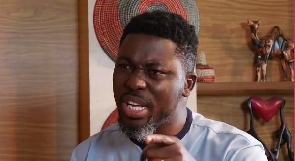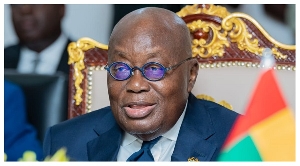- Home - News
- TWI News | TV
- Polls
- Year In Review
- News Archive
- Crime & Punishment
- Politics
- Regional
- Editorial
- Health
- Ghanaians Abroad
- Tabloid
- Africa
- Religion
- Election 2020
- Coronavirus
- News Videos | TV
- Photo Archives
- News Headlines
- Press Release
Opinions of Saturday, 8 May 2010
Columnist: Boah-Mensah, Evans
Vodafone’s apologetic excuses
By Evans Boah-Mensah
Fierce competition in the telecom sector has put Vodafone Ghana in an electric chair and activities of third party actors are electrocuting the company.
Earlier this year, the whole of the country was cut off from the rest of the world because the South Atlantic No. 3 (SAT 3) cable system that carry almost all of the internet and communications traffic from Africa to Europe and the rest of the world got damaged.
According to some officials of the company, the damage to the SAT 3 cable could have been caused by fishermen’s nets, and ship anchors.
Just a couple of weeks ago, a group calling themselves the Vodafone Broadband Users Association in the North issued a statement to express their frustration at their inability to access broadband internet services on the network in the Northern Region.
The Corporate Communication Manager of Vodafone, Isaac Cudjoe, in an explanation on the peoples’ failure to access internet services said: “the cable linking the Northern Region from Kumasi might have been damaged by the activities of some farmers.”
He said the problem was being resolved and could be completed in the next three months.
So for Vodafone, people who have to till the land and cast the net on a daily basis to make a living have become the object of finger-pointing and are said to be sabotaging the operations of the company.
How sad!
At least, this leaves competitors in peace to concentrate on their work in catching up with Vodafone on the provision of data services to people across the country.
But explanations given for the flaws in the company’s operations, must not be allowed to continue if government is serious about ensuring that the number of people with access to the internet is increased from the current estimated meagre 800,000 figure to 12 million within the next five years.
Ghana was the first country in sub-Saharan Africa to have pioneered the penetration of internet services to homes, when in 1995 the NCS was licensed as the first Internet Service Provider in the sub-region. But now the country is ranked as the third in terms of countries with the highest penetration rate in West-Africa, and 28th overall on the continent.
Already, eye-brows have been raised about how millions of Ghanaians will be hooked onto the virtual world.
For others, the coming of some international bandwidth such as Main One cable and Glo 1 will help to resolve the indifferences in the provision of internet services in the country.
A country that aims to leverage on ICT, to achieve economic growth, cannot rely on a service provider who manipulates the provision of bandwidths to ISPs.
Already SAT 3 is now full and only has room for a few more circuits – until the next upgrade is inaugurated.
Besides, ISPs are also unhappy with the pricing regime of Vodafone on the SAT 3. The company now sells its e1 (2megabytes of data per second) on the SAT 3 to ISPs at a cost of US$4,500, which the internet providers argue is too expensive and has made internet access in the country pricey.
Indeed, managers of the new entrants; Glo 1 and MainOne say they are looking to sell the same capacity to ISPs for between US$500 and US$600 and this will make it cheaper for consumers to access high speed broadband Internet.
This will mean that the cost of accessing the internet at homes and in internet cafes will go down by about 90 per cent, when the new entrants start trading on their fibre optic platform for market share.
For Internet Service Providers (ISPs), the coming of the other fibre optic cable operators is very timely as it falls within the realms of the Ghana Broadband Strategy document, which seeks to reduce broadband cost by 80 per cent and also help the government of Ghana to realise its dream of making internet access available to about 50 per cent of the estimated 25 million Ghanaian population over the next five years.
This is a situation that worries ISPs and at the same time provides business opportunities for them, as broadband is not only an issue of high-speed networks, but also provides a platform for interactive technologies that enable ordinary people to produce, share and distribute content on the Web, as well as engage in commerce.
For ISPs, increased broadband penetration will improve the country’s potential competitiveness in the global market. It will also have an impact on health, education and standard of living; the three main indicators in the UNDP Human Development Index (HDI).
Broadband costs between $500 and $1000 in Ghana today to the end user, either on a shared or dedicated basis. This does not include the Customer Premise Equipment (CPE), which ranges between $200 and $10,000. And for a country with an estimated per capita income of US$600, broadband access is not affordable to a majority of the people, besides, PC cost of more than a $1000, plus taxes, deters many potential users.
So as new entrants in the international bandwidth provision come on stream, to create competition in the internet industry, government needs to look at regulating the market, since there are dominant players and the lack of control could result in “cartel” activities and unfair practices.
But events like what happened in January and last two weeks have proven why we need other international bandwidth providers to heat up the competition and ensure that consumers are not taken for granted.
For more articles visit: boa-inghana.blogspot.com










